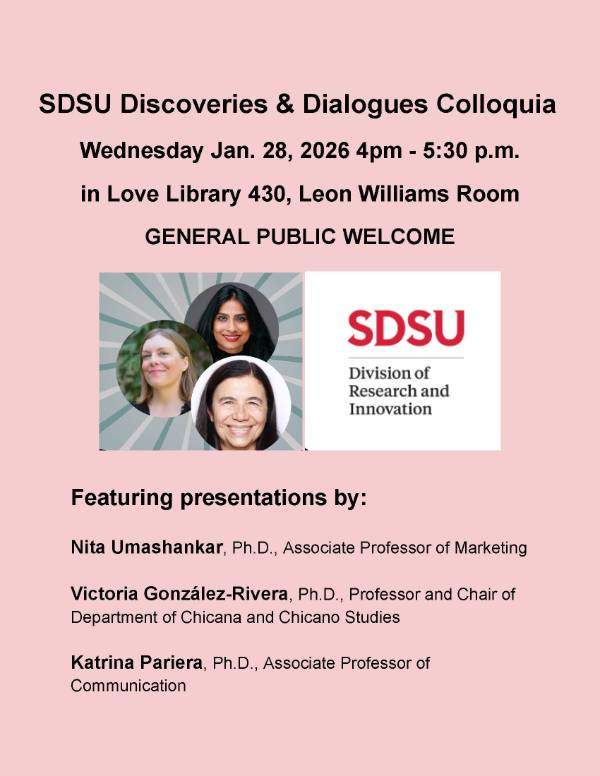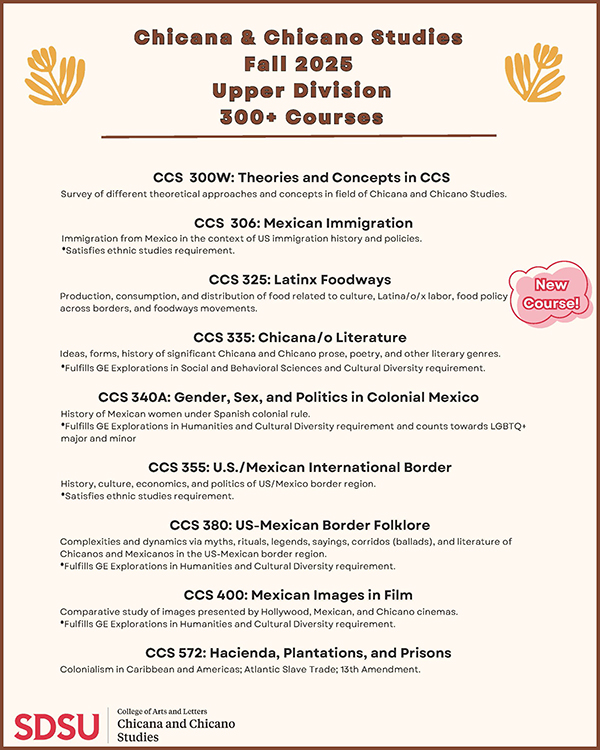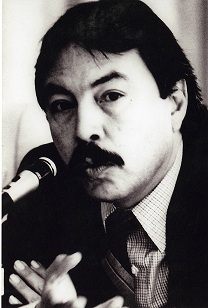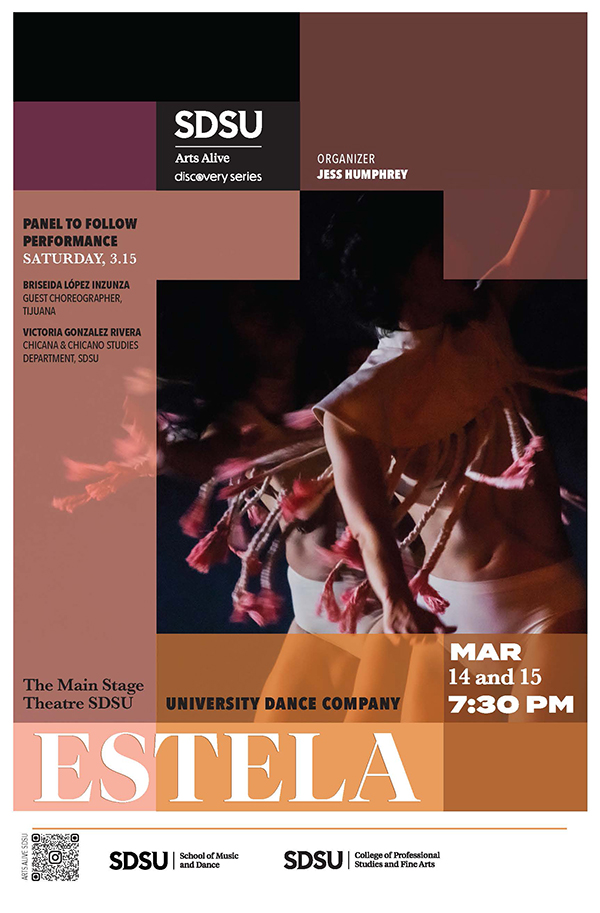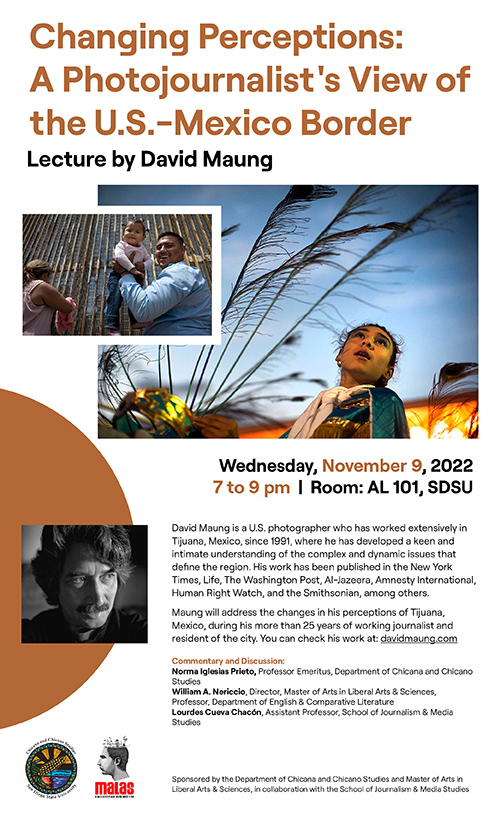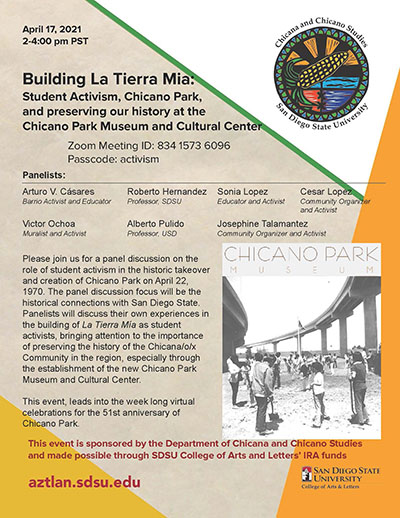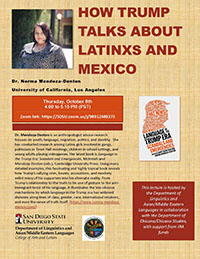
News and Events
SDSU Discoveries & Dialogues Colloquia
Wednesday Jan. 28, 2026
4 - 5:30 p.m.
in Love Library 430, Leon Williams Room
General public welcome
Featuring presentations by:
- Nita Umashankar, Ph.D., Associate Professor of Marketing
- Victoria González-Rivera, Ph.D., Professor and Chair of Department of Chicana and Chicano Studies
- Katrina Pariera, Ph.D., Associate Professor of Communication
"Sports in the Borderlands, the Borderlands of Sports - A Case From Skateboarding"
A talk by Andrea Buchetti, Ph.D. (University of Padua)
Thursday, December 4, 2025
4-6 p.m.
in Storm Hall 205
Reception with Italian refreshments to follow
Borderlands are diffuse cultural matrices through which power, desire, and social creativity are negotiated daily. I articulate this perspective by building on my fieldwork on skateboarding at the U.S.-Mexico border in dialogue with the contemporary anthropology of sports and popular cultures.
Sponsored by the Departments of Chicana and Chicano Studies and Sociology, the Center for Latin American Studies, and Comparative International Studies (Italian Program), the Center for Skateboarding, Action Sports, and Social Change, the Surf and Skate Studies Collaborative, and the Master of Arts in Liberal Arts & Sciences (MALAS) Program.
Past News & Events
Take a look at three CCS courses offered this coming Fall!
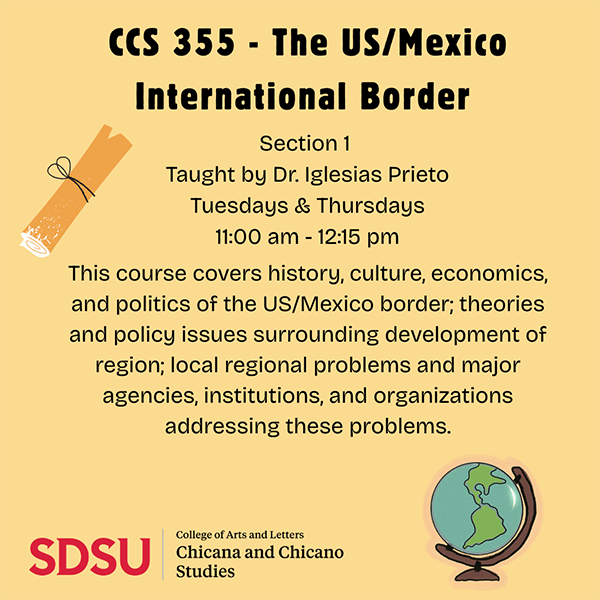
CCS 355 - The US/Mexico International Border
Section 1 taught by Dr. Iglesias Prieto
Tuesdays & Thursdays
11 a.m. - 12:15 p.m.
This course covers history, culture, economics, and politics of the US/Mexico border; theories and policy issues surrounding development of region; local regional problems and major agencies, institutions, and organizations addressing these problems.
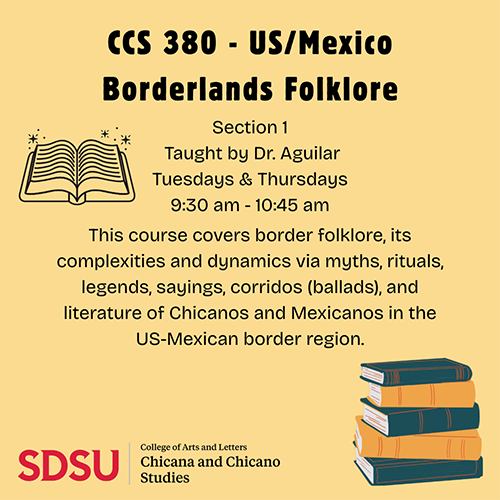
CCS 380 - US/Mexico Borderlands Folklore
Section 1 taught by Dr. Aguilar
Tuesdays & Thursdays
9:30 a.m. - 10:45 a.m.
This course covers border folklore, its complexities and dynamics via myths, rituals, legends, sayings, corridos (ballads), and literature of Chicanos and Mexicanos in the US-Mexican border region.
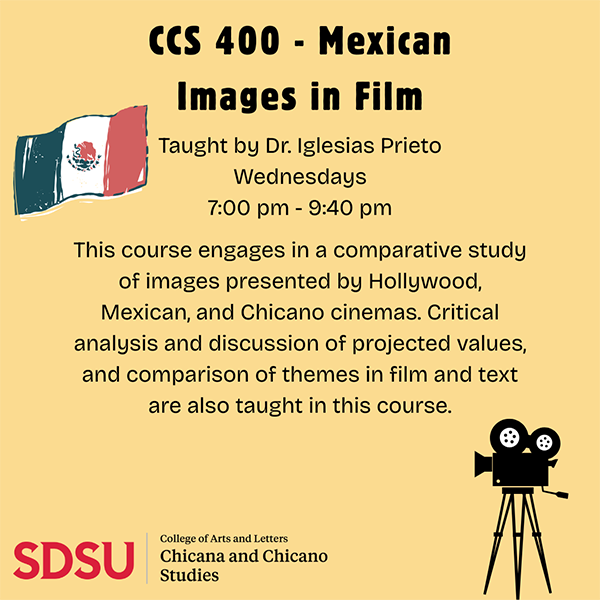
CCS 400 - Mexican Images in Film
Taught by Dr. Iglesias Prieto
Wednesdays
7 p.m. - 9:40 p.m.
This course engages in a comparative study of images presented by Hollywood, Mexican, and Chicano cinemas. Critical analysis and discussion of projected values, and comparison of themes in film and text are also taught in this course.
Fall 2025 registration is now open!
Take a look at the upper division courses we will be offering this fall:
CCS 300W: Theories and Concepts in CCS
Survey of different theoretical approaches and concepts in field of Chicana and Chicano
Studies.
CCS 306: Mexican Immigration
Immigration from Mexico in the context of US immigration history and policies.
Satisfies ethnic studies requirement.
CCS 325: Latinx Foodways (NEW Course)
Production, consumption, and distribution of food related to culture, Latina/o/x labor,
food policy across borders, and foodways movements.
CCS 335: Chicana/o Literature
Ideas, forms, history of significant Chicana and Chicano prose, poetry, and other
literary genres.
Fulfills GE Explorations in Social and Behavioral Sciences and Cultural Diversity
requirement.
CCS 340A: Gender, Sex, and Politics in Colonial Mexico
History of Mexican women under Spanish colonial rule.
Fulfills GE Explorations in Humanities and Cultural Diversity requirement and counts
towards LGBTQ+ major and minor
CCS 355: U.S./Mexican International Border
History, culture, economics, and politics of US/Mexico border region.
Satisfies ethnic studies requirement.
CCS 380: US-Mexican Border Folklore
Complexities and dynamics via myths, rituals, legends, sayings, corridos (ballads),
and literature of Chicanos and Mexicanos in the US-Mexican border region.
Fulfills GE Explorations in Humanities and Cultural Diversity requirement.
CCS 400: Mexican Images in Film
Comparative study of images presented by Hollywood, Mexican, and Chicano cinemas.
Fulfills GE Explorations in Humanities and Cultural Diversity requirement.
CCS 572: Hacienda, Plantations, and Prisons
Colonialism in Caribbean and Americas; Atlantic Slave Trade; 13th Amendment.
New Book
Congratulations to our colleague Victoria Gonzalez-Rivera who just published her groundbreaking book "Five-Hundred Years of LGBTQ+ HIstory in Western Nicaragua."
Digitizing the Chicana/o Education Movement
Congratulations to Dr. Natalie Santizo who received a $300K grant for the project “Unearthing the Chicana/o Movement in San Diego: Digitizing the Education Movimiento”! This award is part of the Digitizing Hidden Collections: Amplifying Unheard Voices Awards initiative administered by the Council on Library and Information Resources.
Dr. Natalie Santizo along with Erika Esquivel (Love Library) will undertake a 36-month project to digitize 112.29 linear feet of archival materials pertaining to the Chicana/o Education Movement. In 1969, Chicanos from SDSU participated in drafting the historic Plan de Santa Bárbara that established the blueprint for Chicana/o higher education programs. SDSU is home to one of the first Chicana/o Studies departments in the nation but has been overlooked within Chicana/o education movement history. This project challenges the presumption that the movement occurred solely in Los Angeles by expanding the geographical scope to the San Diego border region. Alongside digitizing materials like the Chicana/o Studies Department Papers, this project unearths the hidden voices and labor of Chicanas navigating higher education. Materials include scrapbooks, correspondence, newsletters, newspapers, flyers, syllabi, & more. In 2027, the team will hold a series of community archiving workshops at Centro Cultural de la Raza where community members will get the chance to bring in and digitize items.
Read more about the grant on SDSU NewsCenter.
Goodby to our dear colleagues
Dr. Michael Dominguez and Dr. Lilia Soto left San Diego State this summer. Dr. Dominguez is headed to the University of New
Mexico and Dr. Soto to UC Davis. We wish them the best of luck!
Promoted to Professor!
Congratulations to Dr. Roberto Hernández, recently promoted to Professor! Dr. Hernández is a nationally and internationally
recognized scholar and respected instructor; he is well known on and off campus for
his multiple service contributions.
Alumnus in the News
CCS Alumnus, Jose Olague in the News: Chicano Park Mural
Centro Cultural de la Raza’s Board President
Dr. Roberto D. Hernández, associate professor of Chicana/o Studies and the Centro
Cultural de la Raza’s Board President, announces Mellon Grant awarded to a beloved community institution.
Commencement 2023
Friday, May 12, 2023/ Viernes, 12 de mayo de 2023
Arts and Letters Undergraduate Ceremony
1-3 PM
at Viejas Arena
Department ceremony
The San Diego State University Department of Chicana and Chicano Studies cordially invites you to its graduation ceremony honoring the Class of 2023 / El Departamento de Estudios Chicanos de la Universidad Estatal de San Diego le invita cordialmente a su ceremonia de graduación en honor de la Generación 2023
3-4 PM
in Hardy Tower Room, Room 140
- Ashley A. Cervantes
- Evelyn Edil Estrada
- Alek Miguel Gastelum
- Bianca Yesenia González
- Jesse Díaz Moreno
- Myriam Vanessa Ortiz
- Stephanie Reyes
- Karina Tapia
- Alma D. Tercero
- Karla Marie Vargas
- Linea Bartlett Montiel
- Marlenne Guadalupe Carrillo
- Michelle Navarro Lozada
- Dalia Sherlyn Villa De La Cruz
From Professor Michael Domínguez--Reflection and Gratitude, A Note of Transition
Saludos estudiantes y colegas,
This summer, I will be concluding my time as the Latinx Resource Center’s Augustine
“Gus” Chavez Faculty Scholar, and this serves as a note of reflection and gratitude.
The Chicana and Chicano Studies (CCS) Department has been deeply committed for decades to supporting our founding student leaders from AChA, CAFE, EWB, and MEChA. Personally, I have been privileged to have worked closely with these groups since early 2018—a semester after my arrival to SDSU as an assistant professor of Chicana/o Studies—as they organized and pushed for the formation of a Latinx cultural center on campus. As we strategized, regrouped, and imagined new possibilities, the LRC as we know it today came into being. It was first only a concept, but now exists as a physical location adjacent to the CCS Department’s Chicana and Chicano Collection space in the library (which had for years been SDSU’s unofficial hub of Latinx student organizing).
Since 2020, I have served as the inaugural Gus Chavez Faculty Scholar. Gus Chavez was a visionary activist who believed that the university should always be accountable to our communities. He helped found the CCS department in 1969, the Chicano/a Collection in 1970, and then went on to lead EOP. And he was, of course, a fierce advocate for students. It has been a privilege to serve in this role and honor his legacy, and to see all those issues he fought for manifest themselves in our LRC student founders and leaders. The commitment, perseverance, and vision I have seen from our students during my time with the LRC has been phenomenal. I am profoundly grateful to have been invited and entrusted to work and learn alongside some truly exceptional student leaders during these foundational five years. It is inspiring to witness the brilliance, innovative spirit, vision, and commitment to our cultura and racial justice that our students have brought to the center as it has grown and evolved from ideation to physical space, through a pandemic and virtual programming, to a fully-fledged campus hub.
More concretely, my position as the Gus Chavez Faculty Scholar allowed me to form part of the LRC’s original, pioneering leadership team, with its first Director Yesenia Sánchez Garcia and Assistant Director Erik Esqueda. As a team, along with the aforementioned student leaders and staff, we worked persistently toward the goal of forging a cultural center for SDSU’s Latinx population that unapologetically grounds itself in explicit commitments to racial and social justice, guided by a student-centered mission. Collectively, we crafted a core mission statement and principles, responded to challenges both small and large, found a shared voice to speak to issues that face SDSU’s Latinx community, commissioned the LRC’s logo and murals, and supported one another as individuals, both personally and professionally, as folks followed their passions, values, and commitments to imagine powerful programming, and brought those ideas to fruition.
Further, as the connection between the LRC and the campus’ academic faculty, I was lucky to be able to offer conceptual guidance to these visioning and program development efforts. Together, we ensured that our programs were grounded in robust understandings of identity, involved reflective praxis, and met a set of unique needs our student leaders identified that spanned not just student life issues, but concerns around academic experiences and excellence as well.
Out of these conversations came a variety of programs, including the COMUNIDAD program and the Culturally Connected Research Hub (CCRH). On that note, as director and advisor of these endeavors, I will give a special shout out of appreciation to the COMUNIDAD GAs and peer mentors, and CCRH organizers, with whom I worked most directly to author and bring these two programs to life based on needs you identified on campus. In sum, the LRC and its full scope of programming over these foundational five years reflect an important contribution in pushing SDSU forward as a new kind of HSI.
I will say again that it has been my honor to support all the LRC and student leader’s organizational and programming efforts, the partnerships with other cultural centers and campus partners, the connections to departments, and to serve as a link to the tenure-track faculty during these past years. It is bittersweet, but the LRC’s growth means new structures are needed and more support than a professor splitting time multiple ways can reliably offer on the daily. While the LRC will be welcoming a new staff member to take on some teaching responsibilities associated with this role, the Augustine “Gus” Chavez Faculty Scholar position will remain with the Chicana and Chicano Studies Department, with more information to come from the department on this point soon.
As I step away from intensive work with the LRC, I certainly will not be absent. I will continue to chair our Chicana Collection Committee, advise the COMUNIDAD program, and support the work and brilliance of our student leaders as I am needed, nurturing the semillas our founding students planted years ago. I look forward to staying connected and, as always, to welcoming students in my Chicana and Chicano Studies courses.
En comunidad,
Michael Domínguez, Ph.D.
New article
Dr. Roberto D. Hernández wrote an article in the flagship journal for Chicana/o Studies: "Xicano 'World' Traveling
and World Making: Aotearoa Meets Aztlán" Aztlán: A Journal of Chicano Studies, 48:1 (Spring 2023), 173-189.
New Faculty
We are very pleased to welcome our newest faculty member, Dr. Lilia Soto! ¡Bienvenida!
Faculty Promotion
Congratulations to our colega Michael Domínguez on his promotion to Associate Professor! ¡Muchas felicidades!
Invited Lecture
Dr. Victoria González-Rivera was invited by the Escuela de Historia at the University of Costa Rica to give a
presentation on May 18, 2022 titled “Escribir la historia de la diversidad sexual
en el Pacífico de Nicaragua, 1492-1979.” Watch her presentation.
New Certificate
We are excited to announce that a new interdisciplinary K-12 Ethnic Studies Teaching
Certificate program is live! Dr. Michael Domínguez serves as program director. For more information visit the program website.
Book Publication
Congratulations to Professor Adelaida R. Del Castillo, whose new book, Fathers, Fathering, and Fatherhood: Queer Chicano/Mexicano Desire and Belonging, was just released by Palgrave Macmillan. The book was edited along with Gibrán Güido
and brings together a collection of narrative accounts based on queer Chicano/Mexicano
sons; it explores fathers, fathering, and fatherhood.
Inaugural Augustine "Gus" Chavez Faculty-Scholar
Congratulations to our colleague Dr. Michael Domínguez! He has been selected as the first inaugural Augustine "Gus" Chavez faculty-scholar
for the Latinx Resource Center. Michael will direct the COMUNIDAD program. Read the SDSU NewsCenter story about the honor.
Statement of Lament and Solidarity
Our department condemns the violent acts committed against the Asian American community in Atlanta, Georgia on March 16, 2021 and gives our heartfelt condolences to the families of the murdered individuals, including Delaina Ashley Yaun, Xiaojie Tan, and Daoyou Feng. Yesterday’s shootings form part of nationwide rise in violence, discrimination, and xenophobia directed against Asian American and Pacific Islander communities.
We reject the diversionary attempts to dismiss the racial motivations of this violence, and efforts to accept easy explanations that obfuscate the ways that racism is deeply entangled in American life. The shootings reflect the point made by sociologist Nancy Wang Yuen at Biola University that "racism has always intersected with sexism for Asian American women in this country".
We publicly reaffirm our longstanding commitment to social justice, equity, and anti-racist work and call on all to actively contest all forms of racism, sexism, and white supremacy.
New Faculty
We are proud to welcome the newest member of our faculty, Dr. Andrés Ehecatl Aguilar! Bienvenido!
Faculty Award
Congratulations to Dr. Norma Iglesias Prieto who has received an Alumni Association Award for Outstanding Faculty Contributions
to the University for 2020-2021!
Remembering Dr. Juan Gómez-Quiñones
We mourn the loss of Dr. Juan Gómez-Quiñones, one of our department’s founders and a path breaking Chicano historian (1940-2020). He passed away on November 11. We extend our deepest condolences to his family. He personified the highest tenets of our field, as an activist scholar who brought to light the history of Mexican people in the U.S. In the words of one of his colleagues at UCLA, “His presence, his voice, and his heart will be missed by family, friends, and colleagues and the many generations of students that have been influenced and uplifted by his ideas, scholarship and support in the classrooms.”
Juan Gómez-Quiñones, Presente!
Remembering Augustine “Gus” Chavez
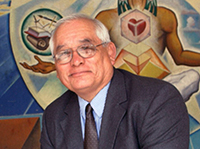 We remember Augustine “Gus” Chavez who passed away one year ago (1943-2019). Dedicated to social and educational justice
and equality, Gus first and foremost mentored and inspired thousands of students.
He also helped build venerable SDSU university and community institutions. As a student
at SDSU, he helped organize the Mexican-American Youth Association, start a chapter
of MEChA, and advocated for the creation of the Department of Chicana and Chicano
Studies. Later he was the architect of the current Office of Educational Opportunity
Programs and Ethnic Affairs. He also established an extensive collection of Chicana/o-related
historical materials housed in Love Library; this is now known as the Chicana/o Collection.
He was also a founding member of the Chicano Federation of San Diego County. Gonzalo
Rojas, former director of SDSU’s Student Outreach Services and a friend to Gus for
over 40 years, expressed: “Gus has always been a warrior; it really is the best way
to describe him, not only back then but up until his passing.” Gus Chavez, Presente!
Learn more about Augustine “Gus” Chavez read the stories on SDSU NewsCenter and The San Diego Union Tribune.
We remember Augustine “Gus” Chavez who passed away one year ago (1943-2019). Dedicated to social and educational justice
and equality, Gus first and foremost mentored and inspired thousands of students.
He also helped build venerable SDSU university and community institutions. As a student
at SDSU, he helped organize the Mexican-American Youth Association, start a chapter
of MEChA, and advocated for the creation of the Department of Chicana and Chicano
Studies. Later he was the architect of the current Office of Educational Opportunity
Programs and Ethnic Affairs. He also established an extensive collection of Chicana/o-related
historical materials housed in Love Library; this is now known as the Chicana/o Collection.
He was also a founding member of the Chicano Federation of San Diego County. Gonzalo
Rojas, former director of SDSU’s Student Outreach Services and a friend to Gus for
over 40 years, expressed: “Gus has always been a warrior; it really is the best way
to describe him, not only back then but up until his passing.” Gus Chavez, Presente!
Learn more about Augustine “Gus” Chavez read the stories on SDSU NewsCenter and The San Diego Union Tribune.
Remembering Gracia Molina de Pick
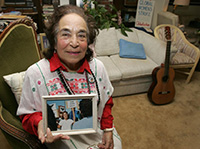 We remember Gracia Molina de Pick, noted Chicana feminist activist, educator, and philanthropist (1928-2019). Gracia
passed last year on August 11, 2019, leaving behind a legacy of commitment to multiple
social justice projects. Here, at San Diego State University, she generously endowed
our department with the Gracia Molina Enriquez de Pick Endowed Undergraduate Scholarship
and the Gracia Molina Enriquez de Pick Endowed Graduate Scholarship. She also donated
her papers to the Chicana/o Archive in Love Library. ¡Gracia Molina de Pick, Presente!
Learn more about Gracia’s life.
We remember Gracia Molina de Pick, noted Chicana feminist activist, educator, and philanthropist (1928-2019). Gracia
passed last year on August 11, 2019, leaving behind a legacy of commitment to multiple
social justice projects. Here, at San Diego State University, she generously endowed
our department with the Gracia Molina Enriquez de Pick Endowed Undergraduate Scholarship
and the Gracia Molina Enriquez de Pick Endowed Graduate Scholarship. She also donated
her papers to the Chicana/o Archive in Love Library. ¡Gracia Molina de Pick, Presente!
Learn more about Gracia’s life.
Teaching and Book Award
Congratulations to Dr. Roberto Hernández! His book Coloniality of the US/Mexico Border: Power, Violence, and the Decolonial Imperative, has received an Honorable Mention in the 2020 Book Awards from the National Association for Chicana and Chicano Studies.
He was also a recipient of a CAL Excellence in Service award for the 2019-2020 academic year!
Hernández Elected to an NACCS Leadership Position
Roberto Hernández, associate professor in the Department of Chicana and Chicano Studies, has been elected to a leadership position in the National Association for Chicana and Chicano Studies (NACCS).
Hernández will become chair of the organization for 2020-21 and serves as chair-elect for the prior year. Formed in 1972, NACCS is part of what Hernández calls an important step in demarcating Chicana and Chicano Studies as an independent discipline with its own canon, schools of thought, professional associations and advanced degree programs, and an international research scope.
Hernández previously served as an at-large representative on the NACCS national board in 2011-13.
Hernández’ research, publications and teaching focus on the intersections of colonial and border violence, the geopolitics of knowledge and cultural production, decolonial political theory, social movements, hemispheric indigeneity, masculinity and comparative border studies.
Hernández earned a Chicana/o Studies Honors B.A. degree (with an emphasis in Political Theory), as well as Masters and Ph.D. in Comparative Ethnic Studies (Black, Native and Chicana/o Studies) from the University of California, Berkeley, where he was also a Researcher with the Center for Latino Policy Research and a Research Fellow at the Institute for the Study of Social Change. He was previously a Visiting Researcher in the Center for Black Studies Research and the Chicana/o Studies Institute at UC Santa Barbara, where he taught in both Chicana/o Studies and Black Studies.
At SDSU, he teaches courses on the U.S.-Mexico border history, theory and contemporary issues, Chicana/o and border folklore, Community Studies, and racialized/gendered captivity and incarceration from colonialism and slavery to the prison industrial complex and migrant detention centers.
"I am excited for this new role and also for thinking about how I can best serve, also in conjunction with the ongoing Ethnic Studies efforts at SDSU and the broader CSU community," Hernández said.
KPBS Podcast
Listen to Dr. Norma Iglesias Prieto's, KPBS podcast, "Getting Education on Other Side."
The History of Presidio Park in Old Town San Diego
Dr. Isidro Ortiz appeared on KPBS’ San Diego Historic Places, as part of the Baja California Series (Part VI Episode 6). The episode, which orginally aired in June 2016, explores Presidio Park to learn more about early colonial history in Baja California and the lives of first Mexican community.
In Memoriam
-
Gus Chavez, one of our department founders and former director of EOP at SDSU, passed away on Sunday, August 18th. He was an ally and friend to our department and a beloved mentor to many students. The Chicano community has lost one of the major figures in the struggle for educational equity and justice. We offer our deepest condolences to his family. Gus Chavez, ¡Presente!
-
Gracia Molina de Pick. Noted Chicana feminist activist, educator, and philanthropist died peacefully in her sleep on Sunday, August 11, 2019. We offer our deep and heartfelt condolences to her family. A series of community memorials will be held in her honor citywide and a celebration of life ceremony will be held at SDSU on August 26. More information: https://www.
graciamolinadepick.com - Dr. Raul Ruiz, pioneering Chicano educator, activist, and journalist passed away on June 17. We give our deepest condolences to his family. May he rest in peace and power. Learn more about Dr. Ruiz.
- Armando Rodriguez, pioneering and lifelong Chicano educator passed away on Sunday, March 10th. We give our deepest condolences to his family. May he rest in peace and power. For more information please read the article in the San Diego Union Tribune and see the a write-up about him and photos.
M.E.Ch.A de SDSU High School Conference
On November 10, 2018 students from around the county attended the 48th annual Movimiento Estudiantil Chicanx de Aztlán de San Diego State University (M.E.Ch.A) conference for high school students. The theme for this year’s conference was: "Liberation of Students: A new self-determined consciousness." The purpose of M.E.Ch.A high school conference is to promote higher education to underprivileged youth through cultural consciousness, political awareness, and community involvement. View the photos on facebook.
Multicultural Hall of Fame Honoree
Please join us in congratulating Dr. Isidro Ortiz, who was inducted into the Multicultural Hall of Fame at Stanford University. Muchas felicidades! Dr. Ortiz an alumni of Stanford University, spoke at a luncheon there on October 26, 2018 as part of their reunion homecoming events. He discussed his life as a scholar-activist.
Book Award
The book published by Montezuma Press, “Chicano Tributes – Activist Women of the Civil Rights Movement,” edited by Rita Sanchez and Sonia Lopez, recently won two awards: (1) First place in the Women’s Issues category of the International Latino Book Awards and (2) First place in The Pinnacle Book Achievement Awards – Best Book in the category of Recovery for “Chicano Tributes – Activist Women of the Civil Rights Movement.” Some of the women featured in the book include Chicano and Chicana Studies’ Norma Iglesias-Prieto, Coral MacFarland Thuet, Bertha Hernández (author) and Women Studies' Irene Lara. Read the story on SDSU NewsCenter.
News Article
Dr. Victoria Gonzalez-Rivera was featured in two news articles: Anti-Government Protests Continue in Nicaragua (KQED News) and Nicaragua in Crisis (Latino USA)
Women's Suffrage in the Americas
Dr. Victoria Gonzalez-Rivera was a visiting faculty member at the NEH Summer Institute "Women's Suffrage in the Americas" that took place at Carthage College in Kenosha, Wisconsin in July 2018.
New Book Out
Roberto D. Hernández, Assistant Professor of Chicana and Chicano Studies just published a co-edited book: Decolonizing the Westernized University: Interventions in Philosophy of Education from Within and Without with Lexington Books. The collected essays provide a sharper understanding of the neoliberal crisis in education and knowledge production and the responses to it at multiple sites around the world.
Performance and Panel Discussion: Estela
Saturday, March 15, 2025
7:30 p.m.
at The Main Stage Theatre SDSU
As part of their annual University Dance Company performance, SDSU dance majors will perform Estela, choreographed by Tijuana-based dance artist Briseida López Inzunza.
Following the performance, SDSU Department of Dance faculty, López Inzunza and Professor Victoria González-Rivera will discuss the struggle for justice by Latin American women. This event offers a unique exploration of activism through dance.
Part of SDSU Arts Alive
Five Hundred Years of LGBTQIA+ History in Western Nicaragua
Thursday, February 20, 2025
5:30-7 p.m.
at Scripps Cottage
Join us in celebrating Chicana and Chicano Studies Professor, Victoria González-Rivera, on her new book titled, Five Hundred Years of LGBTQIA+ History in Western Nicaragua.
A book reading will be held followed by Q&A and light refreshments.
Thank you to our co-sponsors for this event: the Department of Women’s, Gender, and Sexuality Studies, the LGBTQ+ Studies program, and the Chicana and Chicano Archive Committee.
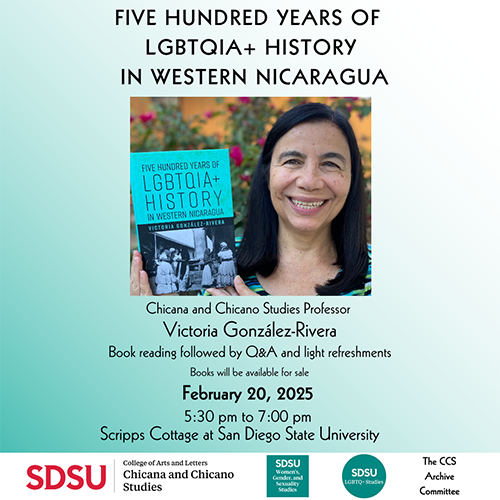
Celebrating Art, Culture, and Community: Mural Dedication
Thursday, February 13, 2025
4-6 p.m.
in Love Library, CCS Collections (LL-160)
The Chicano/a Studies Department at SDSU invites the community to the dedication of murals that honor the diverse histories, cultures, and contributions of our communities.
The murals are a celebration of the many voices and stories that have shaped our shared experiences, reflecting the rich cultural tapestry that exists within and beyond our campus. The dedication event will offer light snacks and refreshments, and a space for all to come together in recognition of our collective legacy.
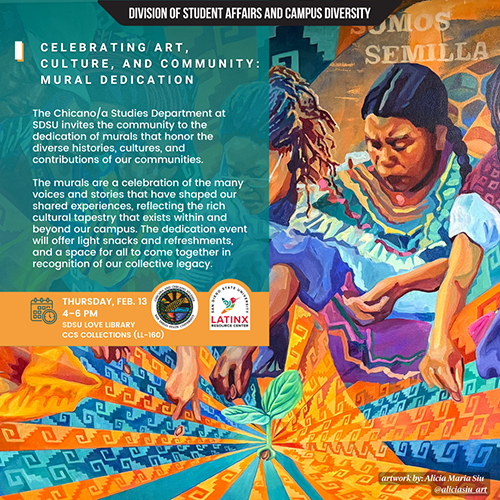
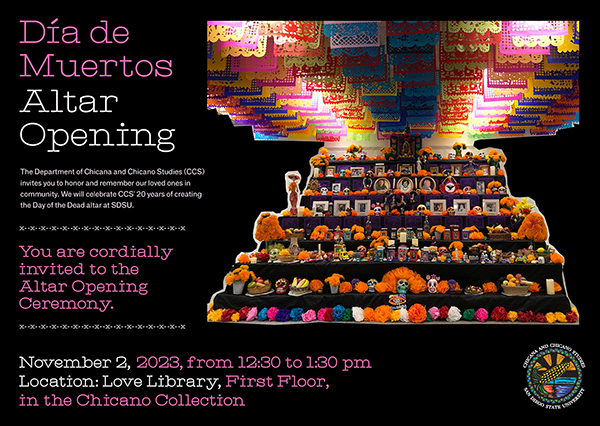 Día de Muertos Altar Opening
Día de Muertos Altar Opening
You are cordially invited to the Altar Opening Ceremony.
November 2, 2023
12:30 – 1:30 p.m.
Location: Love Library (first floor, in the Chicano Collection)
The Department of Chicana and Chicano Studies (CCS) invites you to honor and remember your loved ones in the community. We will celebrate CCS’ 20 years of creating the Day of the Dead altar at SDSU.
Changing Perceptions: A Photojournalist's View of the U.S.-Mexico Border
Lecture by David Maung
Wednesday, November 9, 2022 | 7-9 p.m. I Room: AL 101, SDSU
David Maung is a U.S. photographer who has worked extensively in Tijuana, Mexico, since 1991, where he has developed a keen and intimate understanding of the complex and dynamic issues that define the region. His work has been published in the New York Times, Life, The Washington Post, Al-Jazeera, Amnesty International, Human Right Watch, and the Smithsonian, among others.
Maung will address the changes in his perceptions of Tijuana, Mexico, during his more than 25 years of working journalist and resident of the city. You can check his work at: davidmaung.com
Commentary and Discussion:
- Norma Iglesias Prieto, Professor Emeritus, Department of Chicana and Chicano Studies
- William A. Nericcio, Director, Master of Arts in Liberal Arts & Sciences, Professor, Department of English & Comparative Literature
- Lourdes Cueva Chacon, Assistant Professor, School of Journalism & Media Studies
Sponsored by the Department of Chicana and Chicano Studies and Master of Arts in Liberal Arts & Sciences, in collaboration with the School of Journalism & Media Studies.
Altar de Día de Muertos
As is our department’s tradition for more than 18 years, we will have our Altar de Día de Muertos. Since 2019, we have been staging it in the Love Library instead of the AL third-floor hallway. The library’s location has allowed more people to see the Altar and to take an interest in this beautiful cultural tradition. For a year, the Latinx Resource Center has collaborated with us to design and assemble the Altar, which is also important because it allows us to contact more students, in addition to those who take our classes.
I invite you to join us at the opening and to participate in several activities that will take place around this Altar. I am including three flyers below; feel free to share them with your fellow students, friends, and family.
One of the flyers is for the opening of the Altar, scheduled for Tuesday, November 1 at noon, on the library’s first floor across from the Chicano Collection. There will be an opening ceremony of this beautiful event. Various people from CCS and the LRC will offer remarks. We will also have music and the typical pan de muertos and coffee. We hope you see you there.
Each year the Altar is dedicated to our loved ones who have passed away and to a sociopolitical issue that we consider critical and essential to reflect on. This year the theme is the struggle for autonomy. Some of my students will create small objects honoring the memory of leaders who have given their lives in defense of autonomy (be it environmental, ethnic, gender, sexuality, etc.).
The second flyer is a call for photo submissions of people you want to honor; they can be family members or people who have fought for autonomy. All photos will be mounted on the Altar.
The third flyer is to invite volunteers to set up the Altar. At CCS and LRC, we understand that making the Altar is always a collective effort that creates and strengthens ties with our students and the SDSU community.
I hope you help me by promoting this activity and that you join us at the opening.
Un abrazo,
Norma V Iglesias Prieto, Ph.D.
Professor Emerita, Department of Chicana and Chicano Studies
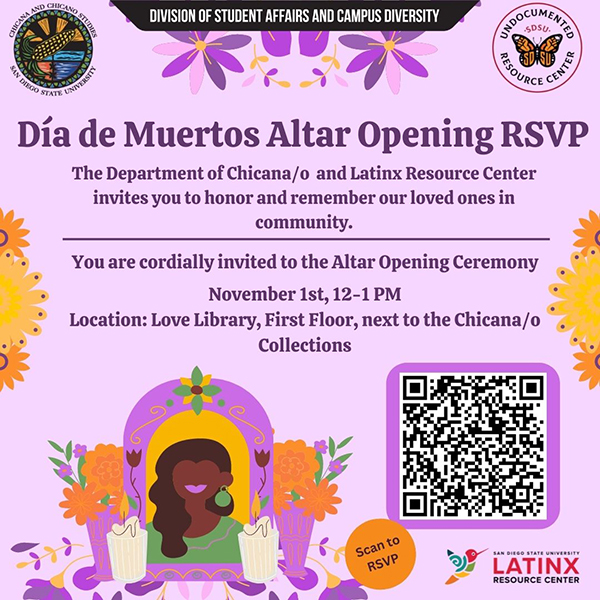
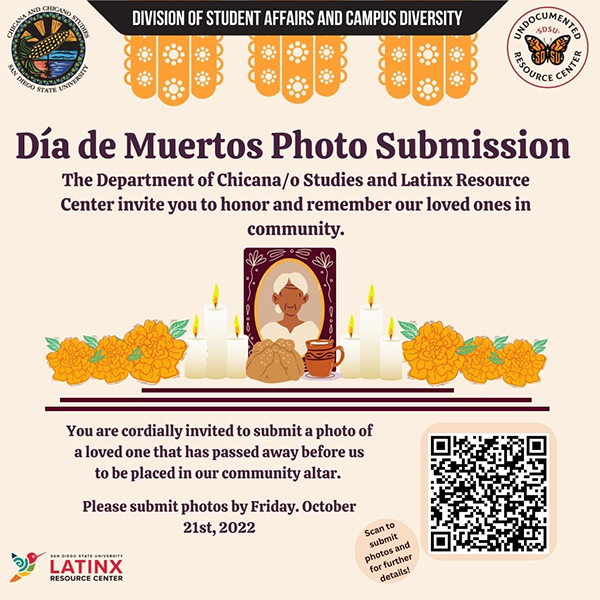
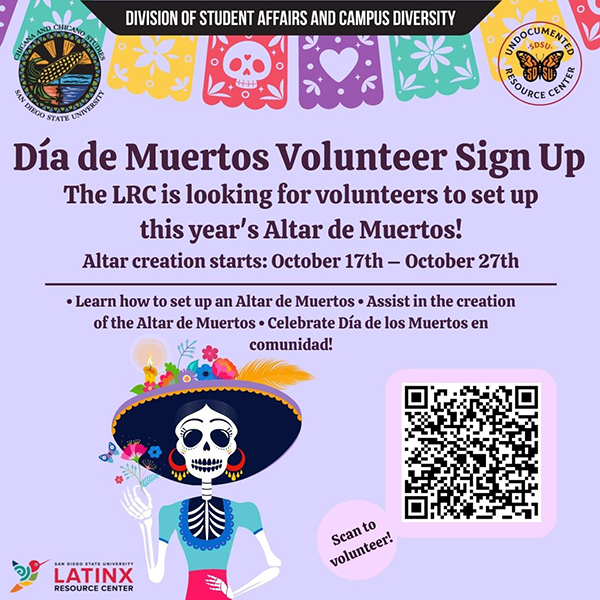
In solidarity! Puerto Rico, Hurricane Fiona, and Grassroots Organizations.
From our colleague Roberto Hernández
As many of you have seen, Hurricane Fiona swept through Puerto Rico Sunday into Monday, leaving the vast majority of the island without power or water, and causing a great deal of flooding in many areas in the South and West of the island (not the metro area as much). Yesterday was the fifth anniversary of the devastating Hurricane María that folks are still struggling to recover from. Natural disasters in Puerto Rico are exacerbated by a number of infrastructural issues related to the archipelago’s colonial status and federally imposed fiscal austerity measures. Fortunately, most people in my immediate circles are generally okay, besides being without electricity and water. However, many people lost their homes, belongings, and livelihoods. As a place that struggles with food sovereignty and where everything is imported (making the cost of everything much higher than it is even here in California), the flooding that destroyed swaths of crops (plantains, etc.) will have a great impact.
Below is a list of different grassroots organizations that are accepting donations to help with immediate on-the-ground assistance. Many of the government FEMA funds never got to people post-María because of the intense bureaucracy policing individuals in need, local government corruption as well the general lack of clarity on Puerto Rico’s unique relationship to the use of federal funds. The organizations below are all trusted folks, vetted by people who work directly with communities in need. Please feel free to share with folks in your networks.
- Brigada Solidaria del Oeste
- Maria Fund
- Taller Salud
- Mujeres Ayudando Madres
- Casa Pueblo
- Taller Comunidad la Goyco
- Techos Pa' Mi Gente
Many of these fundraising campaigns are happening on social media and websites are not necessarily updated with the latest information due to the difficulty in accessing power, but each of these links enables a donation feature. There are also other orgs; however, if you are sending assistance, be sure to work with grassroots organizations. It is well documented that in the aftermath of Hurricane María these were the most efficient at getting direct assistance to folks quickly.
Building La Tierra Mia: Student Activism, Chicano Park, and preserving our history at the Chicano Park Museum and Cultural Center
April 17, 2021
2-4PM (PST)
Please join us for a panel discussion on the role of student activism in the historic takeover and creation of Chicano Park on April 22, 1970. The panel discussion focus will be the historical connections with San Diego State. Panelists will discuss their own experiences in the building of La Tierra Mía as student activists, bringing attention to the importance of preserving the history of the Chicana/o/x Community in the region, especially through the establishment of the new Chicano Park Museum and Cultural Center.
This event, leads into the week long virtual celebrations for the 51st anniversary of Chicano Park.
Dolores Huerta Plaque Dedication
The Department of Chicana/o Studies had the honor of collaborating with the President’s Office, the Office of International Affairs, and the Office of University Relations and Engagement to create this plaque for Dolores Huerta and publicly dedicate it to her during her Zoom campus visit on March 15, 2021.
CCS Department Chair, Dr. María Ibarra said the following:
We offer this de todo corazón as a physical marker that reminds us of some of the historic accomplishments of one of the world’s most recognized labor and civil rights leaders. For many people in our community, especially those of us who come from farm worker families, this plaque also signifies that our lives as well are worthy of memorialization.
The plaque is found in a beautiful spot on the campus, the bridge at Scripps Cottage, one which hundreds of students cross every day. It is above a small pond, surrounded by trees; the location can now be described as a “site of conscience,” a site that not only invites critical reflection but also dialogue, empowerment, and action.
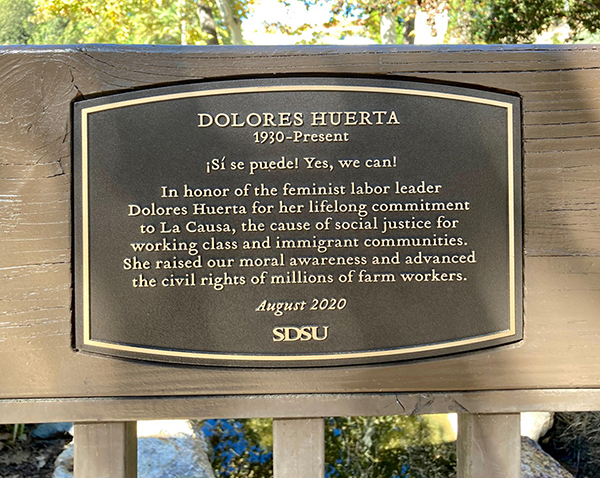
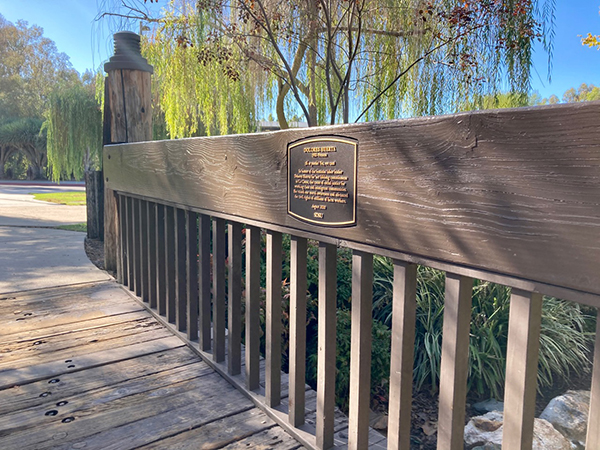
Fall 2020 Events
September 19, 7:00 PM. A Crushing Love: Chicanas, Motherhood, and Activism
Film screening/Q & A with pioneering Chicana feminist director Sylvia Morales moderated by Dr. Maria Ibarra. Hosted by the 27th Virtual San Diego Latino Film Festival in collaboration with the Department of Chicana and Chicano Studies.
September 21, 8:45 PM. The Devil Never Sleeps
Film screening/ Q & A with internationally recognized feminist director Lourdes Portillo moderated by Dr. Norma Iglesias Prieto. Hosted by the 27th Virtual San Diego Latino Film Festival in collaboration with the Department of Chicana and Chicano Studies.
September 30th, 5:00-6:30 PM. Awakening the Dead: Commemorating Spanish Colonialism in 21st Century New Mexico
Lecture by Dr. Michael Trujillo, Department of American Studies and Chicano Studies Program, University of New Mexico
In the summer of 2020, the Black Lives Matter movement reignited the national conversation over monuments and, in Albuquerque, New Mexico, protestors sought to topple a statue depicting the state’s first Spanish colonial governor, Juan de Oñate. In this presentation, Dr. Trujillo considers both the national and the specific regional racial politics of monuments to Spanish colonization in the U.S. Southwest and pays special attention to Oñate statues as well as a conquistador icon in the University of New Mexico’s seal and several controversial UNM murals that have been either preserved or destroyed. He argues that the reappraisal and elimination of Spanish identity celebrations exemplifies an emergent racial order with implications beyond the state’s borders.
Made possible through CAL/IRA funds.
October 8, 4:00-5:15 PM. How Trump Talks About Latinxs and Mexico
Lecture by Dr. Norma Mendoza-Denton, University of California Los Angeles.
Dr. Mendoza-Denton is an anthropologist whose research focuses on youth, language, migration, politics, and identity. She has conducted research among Latina girls involved in gangs, politicians in Town Hall meetings, children in school settings, and young adults playing videogames. Her latest book is Language in the Trump Era: Scandals and Emergencies, McIntosh and Mendoza-Denton (eds.), Cambridge University Press. Using many detailed examples, this fascinating and highly topical book reveals how Trump's rallying cries, boasts, accusations, and mockery enlist many of his supporters into his alternate reality. From Trump's relationship to the truth to his use of gesture to the anti-immigrant tenor of his language, it illuminates the less obvious mechanisms by which language in the Trump era has widened divisions along lines of class, gender, race, international relations, and even the sense of truth itself.
Department of Anthropology. Program hosted by the Department of Linguistics and Asian/Middle Eastern Languages in collaboration with the Department of Chicana and Chicano Studies. Made possible through CAL/IRA funds.
October 19, 2:00-3:00 PM. Vulnerability and Covid 19: Migrants on the U.S.-Mexico Border
Lecture by Soraya Vazquez, Director of NGO “Families Belong Together” (Tijuana).
October 26, 2:00-3:00 PM. Photo Reporting: Migrant Caravans and the U.S.-Mexico Border
Lecture by Guillermo Arias, Independent photojournalist
October 28, 6:30-9 PM. Singing our Way to Freedom
Film screening/Q&A with Director Paul Espinoza and Dr. Ana Celia Zentella, UC San Diego; Moderated by Dr. Maria Ibarra and Dr. Alda Blanco
Hosted by The College of Education and the Language Acquisition Resource Center (LARC) as part of LARC FFuN series and co-sponsored by the Department of Chicana and Chicano Studies and the Department of Spanish and Portuguese
November 2, 2:00-3:15 PM. Duelo/Luto: Las Alteridades en Tiempos de Covid-19; Grief/Mourning: Otherness in Times of Covid-19. Annual Day of the Dead Commemoration.
In honor of Mexican immigrants in the U.S. as well as indigenous communities, public health workers, and sex workers in Brazil. Program moderated by Dr. Norma Iglesias Prieto in collaboration with Dr. Jose Miguel Nieto Olivar and Dr. Cristiane da Silva Cabral from the College of Public Health, University of Sao Paulo, Brazil. English/Spanish/Portuguese.
November 10, 9:30-10:45 AM. On the Underground Railroad: Black Flight & Mexican Freedom Destinations.
Lecture by Maria Esther Hammack, Doctoral candidate in History at UT Austin and Mellon ACLS Dissertation Completions Fellow, 2020-2021; Moderated by Dr. Victoria González-Rivera
Sponsored by the Department of Chicana and Chicano Studies and made possible through CAL/IRA funds.
November 23, 2:00-3:15 PM. Chicano/a/x Printmaking: Making Prints and Making History.
Lecture and art catalog release by lead curator of CCS 50th anniversary art exhibit, Dr. Norma Iglesias Prieto
Latinx Community Circle: The Border Wall, Indigenous Sovereignty, and Our Shared Struggles
Thursday, August 6, 2020
4-5:30pm
bit.ly/communitycirclelrc
Meeting ID: 926 2570 6758
Join us for a conversation about the border wall’s impact on Indigenous sovereignty and sacred sites, and the struggles for justice we share across communities and identities. We are honored to be joined by SDSU Kumeyaay Tribal Liaison and American Indian Studies assistant professor Jacob Alvarado Waipuk.
We invite (but do not require) you to read Jacob’s essay sharing the Kumeyaay perspective on the border wall prior to our conversation.
Part of the Latinx Resource Center's Summer Teach In Series.
Conversación Comunitaria: Anti Blackness in the Latinx Community
Join us for a critical conversation led by Dr. Victoria González Rivera from the Chicana & Chicano Studies Department at SDSU.
Thursday, June 18, 2020
3:00-4:30pm
bit.ly/AntiBlacknessLatinx
Theatre Performance: UN-
Wednesday, May 1; Thursday, May; Friday, May 3
7:30pm
San Diego State University - Experimental Theatre
TuYo is presenting its first independent production as a Latinx theatre organization. Performances will take place the first week of May in the Experimental Theatre at San Diego State University.
“UN-” is a collection of stories written by Latinx authors across both San Diego and the U.S.. The bilingual production weaves together movement, song, film, and poetry to tell stories of how immigrants make it through this country. It reclaims what it means to be American by amplifying the voices of Dreamers, DACA recipients, and the undocumented who’ve been disenfranchised around citizenship. It shows immigrants in times of trouble, in times of triumph, and in their everyday lives. It lifts the shroud around and celebrates the full, human self.
UN- is partially funded by the San Diego State University’s Student Success Grant and TuYo Theatre.
Featuring SDSU students, alumni, and faculty on all aspects of production.
Written by: Kennedy Garcia, Jesus Valles, Cynthia Ochoa, Marielle Vizcarra, Diana Burbano, Georgina Escobar, Mario Vega with Eliza Vedar, and Mabelle Reynoso
Directed by: Peter Cirino
Medical Borders and American Borderlands: Medical Authority, Jim Crow, and Latina/o Civil Rights
Thursday, May 2
9:30-10:45 AM
Love Library 406
John Mckiernan-Gonzalez, PhD
Professor of Southwest Studies and Director of the Center for the Study of the Southwest at Texas State University. Author of Fevered Measures: Public Health and Race at the Texas-Mexico Border, 1848-1942 (Duke, 2012) and co-editor of Precarious Prescriptions: Contested Histories of Race and Health in North America (Minnesota, 2014).
50th Anniversary Celebration
In April of 1969 the historic Plan de Santa Barbara – which established the blueprint for Chicana/o Studies programs and departments across the nation – was signed. To mark this foundational moment in our history, we kick-off a yearlong 50th anniversary commemoration this month. We invite you to join us! (More events will be added, so please check our website continuously throughout the year).
For more information, please visit ccs-50.sdsu.edu.
MEChA 50th ANNIVERSARY CELEBRATION
April 27, 2-7 pm | Storm Hall West Patio
Organized by MEChA
BOOK READING AND PANEL DISCUSSION
Chicana Movidas: New Narratives of Activism and Feminism in the Movement Era
Dr. Dionne Espinoza, Dr. Maylei Blackwell, Anna Nieto Gomez, and others
April 25, 9:30-10:45 am | Love Library 430
LECTURE
Violence, the State and Gendered Indigenous Agency in the Brazilian Amazon
José Miguel Nieto Olivar
April 23, 7-8 pm | Arts & Letters 104
COMMUNITY CELEBRATION
Chicano Park Day
April 20, 10 am-5 pm | Logan Ave. & Cesar E. Chavez Parkway
Finding Aztlan in a Lost Mexican Codex: Places Left Unfinished at the Time of Creation
Friday, April 19, 4 pm
Storm Hall West 011
Reception to follow
Please join us for the History Department's annual Appleby Lecture, given this year by Harvard University historian Davíd Carrasco. His lecture, "Finding Aztlan in a Lost Mexican Codex," will focus on the intellectual adventure of the rediscovery and decipherment of the Mapa de Cuauhtinchan (ca. 1540) in which the search for Aztlan plays a prominent role. Painted on bark paper, and measuring some three by six feet, the Mapa de Cuauhtinchan contains over seven hundred images and symbols relating to the social memory of an indigenous community struggling to hold its own in the turbulent atmosphere of colonial Mexico.
Dr. Davíd Carrasco, the Neil L. Rudenstine Professor of the Study of Latin America at Harvard University, is an award-winning author of more than a dozen books, whose research and writing has focused on religion and spirituality among the Aztecs and other pre-contact Mesoamerican societies. He has worked extensively on major archeological sites, including the discovery and exploration of the Aztec Templo Mayor in Mexico City. In addition to his wide-ranging scholarship on the Mesoamerican past, Dr. Carrasco is a prominent public intellectual, whose work on Chicano and indigenous identity and spirituality has been featured on PBS. He has also collaborated on projects with leading figures in the United States and Mexico, including Cornel West, Toni Morrison, and Carlos Fuentes. The Mexican government has awarded him the highest honor given to a foreign citizen, the Mexican Order of the Aztec Eagle for his contributions to understanding the history and cultures of Mexico.
Sponsored by the Department of History, President's Office, Department of Chicana & Chicano Studies, and MALAS. Made possible by the Andrew Bell Appleby Endowment.
BOOK READING AND LECTURE
Starving for Justice: Hunger Strikes, Spectacular Speech, and the Struggle for Dignity
Dr. Ralph Armbruster-Sandoval
April 18, 2-3:15 pm | Arts and Letters 101
Roots of Immigration: Public Security Policies in El Salvador
Monday 4/15, 1-2 pm in Scripps Cottage
Dr. Jose Morales - Former Dean of the Law School at National University and Vice President of the Central American Commission for the Defense of Human Rights
There will also be second more informal discussion on the new proposed amnesty law in El Salvador with Dr. Morales in NH 229 at 3 pm on April 15.
AChA HIGH SCHOOL CONFERENCE
Association of Chicana Activists
April 13, 9 am-3 pm | Montezuma Hall
Organized by AChA
SCHOLARSHIPS
César E. Chavez Commemorative Luncheon
April 12, 11:30 am-1:30 pm | Montezuma Hall
LECTURE
Latino/a Criminialization and Punishment
Dr. Jerry Flores
April 11, 9:30 -10:45 am | Love Library 406
Co-sponsored by SDSU Common Experience
INVESTITURE / SDSU PRESIDENT ADELA DE LA TORRE
April 11, 2-4 pm | Viejas Arena
https://inauguration.sdsu.edu/
MamaScholars: Mothering in Academia Series
You are invited to the MamaScholars: Mothering in Academia Series. This series is organized with the goal of building community and opening healing spaces for MamaScholars. The series aims to create academically-informed consciousness-raising spaces for mothers and allies about the particular needs of mothering across culture, race, ethnicity, class, citizenship status, gender, sexuality, size, age, ability, and relationship status. In order to do this, we’ve invited scholars, community activists, and healers of color to promote educational tools for creating positive self-agency. At the heart of our vision is creating a mothering collective that advocates for mothers' needs in support of their academic goals.
Mothering in Academia Series is organized by the Nepantleras Feminist Collective and Dr. Irene Lara, and supported by the Student Success Fee (SSF), the Women’s Studies Department, Women’s Resource Center, SELACH, MALAS, Latin American Studies, Africana Studies, Chicana/o Studies, Safe Zones, and ONE SDSU Community.
Schedule:
- MARCH 21, 6 - 7:30 pm: Ana Castillo Community Reading at National City Library. No registration required.
- MARCH 22, 9am-12pm or 1-4pm. Writing Workshop at SDSU. Pre-registration required bit.ly/AnaCastilloWorkshop, limited capacity.
- MARCH 23, 8:30am - 4:30pm. SDSU Scripps Cottage. Registration required bit.ly/MamaScholars
For more Details: info/contact: [email protected] | follow us on Instagram for updates: @las_nepantleras
Latino Film Festival
March 14-24, 2019
Save the date for the SD Latino Film Festival. Sponsored by the San Diego Union-Tribune and Media Arts Center the film festival highlights the wok of international media artists and journalists.
This year’s competition theme is a unique and timely cross-border project: The “Migrant Voices Today” Film Challenge (Voces de los Migrantes).
CCS Professor Norma Iglesias-Prieto will help judge the video competition.
More information at https://2019.sdlatinofilm.com/migrantvoices
Book Presentation: Autonomy is in Our Hearts: Zapatista Autonomous Government through the Lens of the Tsotsil Language
Thursday, March 14, 4 pm, Hepner Hall 209
Join us for this book presentation of Autonomy is in Our Hearts: Zapatista Autonomous Government through the Lens of the Tsotsil Language by author Dylan Eldredge Fitzwater.
Following the Zapatista uprising on New Year’s Day 1994, the EZLN communities of Chiapas began the slow process of creating a system of autonomous government that would bring their call for freedom, justice, and democracy from word to reality. Autonomy Is in Our Hearts analyzes this long and arduous process on its own terms, using the conceptual language of Tsotsil, a Mayan language indigenous to the highland Zapatista communities of Chiapas.
The words “Freedom,” “Justice,” and “Democracy” emblazoned on the Zapatista flags are only approximations of the aspirations articulated in the six indigenous languages spoken by the Zapatista communities. They are rough translations of concepts such as ichbail ta muk’ or “mutual recognition and respect among equal persons or peoples,” a’mtel or “collective work done for the good of a community” and lekil kuxlejal or “the life that is good for everyone.” Autonomy Is in Our Hearts provides a fresh perspective on the Zapatistas and a deep engagement with the daily realities of Zapatista autonomous government. Simultaneously an exposition of Tsotsil philosophy and a detailed account of Zapatista governance structures, this book is an indispensable commentary on the Zapatista movement of today.
About the author
Dylan Eldredge Fitzwater has encountered the Zapatistas as a human rights observer,
a participant in several international gatherings, and as a student at the Zapatista
language school in Oventik. He currently lives in Portland, OR, and works at Burgerville,
a regional Oregon fast-food chain, where he is an organizer for the Burgerville Workers
Union, an affiliate of the Industrial Workers of the World.
Free and open to the public!
Nicaragua's Current Human Rights Crisis
Monday, February 25, 2019
12-1pm
Arts and Letters ( AL) 132
A brown-bag presentation by Victoria González Rivera, Professor in the Department of Chicana/o Studies.
For more information, contact Grace Cheng at [email protected].
Part of the Interdisciplinary Human Rights Initiative (IHRI) Series on Human Rights Issues
New Book Presentation and Signing
Monday, December 3 at 1 pm
Chicana/o Collection, Love Library First Floor
Join us for a new book presentation of Coloniality of the U-S///Mexico Border: Power, Violence, and the Decolonial Imperative by Dr. Roberto D. Hernández.
Hernandez weaves together corridos, fiction, government documents, maps, and other
sources to examine geographic, territorial, and historical burdens that have led to
a complicit endorsement of border violence.
-Emma Perez
Book talk with signing to follow
The Chicano Blowouts of 1968
Monday, November 26, 2018 • 6:30 pm
Mary Hollis Clark Conference Center
San Diego Central Library
@ Joan Λ Irwin Jacobs Common
330 Park Blvd, 92101
Fifty years ago, a group of students in East L.A. led a series of walkouts that resulted in change to the education system that many thought was impossible. The 1968 Chicano Blowouts changed the lives of students everywhere.
Join Professor Isidro Ortiz of the Department of Chicana/o Studies at SDSU for a stimulating discussion about the rise and legacy of this student movement that fought for educational justice and against unequal conditions and racism in Los Angeles high schools.
“Desde Más Acá” Exhibit Opening
Thursday, November 15 from 6 to 8 pm
Gallery inside the SDCC Campus (1313 Park Blvd. San Diego, CA. 92101)
As part of the 7th Binational Conference on Border Issues 2018 (organized by San Diego City College, COLEF, and UABC), there will be an art exhibit titled “Desde Más Acá” at SD City College’s City Gallery. Dr. Iglesias-Prieto and eight of her former students are participating with a piece elaborated with “Border Mental Maps."
BEYOND THE WALL: RESISTANCE AMONG BORDER COMMUNITIES
At a time in which democracies are failing, in the face of a dehumanizing and predatory
system, and as we witness the fortification of the wall between Mexico and the United
States, we are interested in discussing and showing the forms of resistance that have
arisen from the border and transborder communities. The Trump administration generates
tension that directly affects the daily life of Latina/os, especially those from Mexico
and from border communities. What are the possible ways to face this new neoconservative
order? From what organizational experiences have we begun to create spaces for reflection
and transformative action? How do we respond to new and old forms of discrimination
towards marginalized groups?
MÁS ALLÁ DEL MURO: RESISTENCIAS DESDE LAS COMUNIDADES FRONTERIZAS
En esta coyuntura en la que las democracias están fallado como una opción frente a
un sistema deshumanizante y depredador y cuando asistimos a la fortificación del muro
entre México y los Estados Unidos, nos interesa discutir y mostrar las formas de resistencia
surgidas desde las comunidades fronterizas y transfronterizas. La llegada de Trump
a la presidencia de los Estados Unidos ha generado una tensión entre la población
que afecta directamente la vida cotidiana de personas de origen latino y especialmente
de México y de las comunidades fronterizas. ¿Cuáles son las posibles formas de enfrentar
este nuevo orden neoconservador? ¿Desde qué experiencias organizativas se han empezado
a crear espacios de reflexión y acción transformadora? ¿Cómo responder a las nuevas
y viejas formas de discriminación y negación de las minorías?
Human Rights Abuses and Central American Families on the U.S./Mexico Border: Historical Roots and Contemporary Problems
Friday November 9, 12-4 PM, Scripps Cottage
Join us for this symposium featuring (in order of appearance):
Trans and LGBTTI Migration from Honduras By Suyapa Portillo Villeda, Ph.D. Associate Professor, Pitzer College. Frequent contributor to the North American Congress on Latin America (NACLA) Report on the Americas, the Huffington Post, and other media, and author of academic articles on Honduras in multiple journals and books.
From Obama to Trump: Constructing a Central American “Refugee Crisis” By Leisy Abrego, Ph.D. Associate Professor, UCLA. Author of the award-winning book, Sacrificing Families: Navigating Laws, Labor, and Love Across Borders (Stanford University Press, 2014)
Minor Offenses: Children, Violence, and Refugee Migration By Ester Hernández, Ph.D. Professor, Cal State Los Angeles. Co-editor of the award-winning book, U.S. Central Americans. Reconstructing Memories, Struggles, and Communities of Resistance (The University of Arizona Press, 2017).
The Role of "Race" and "Racial Scripts" in Understanding U.S. Response to Central American Migrants By Arely Zimmerman, Ph.D. Assistant Professor, Pomona College. Co-author of By Any Media Necessary: the New Youth Activism (NYU Press, 2016).
Contemporary Human Rights Abuses in Nicaragua and in U.S. Asylum Policies By Victoria González-Rivera, Ph.D. Associate Professor, SDSU. Author of Before the Revolution. Women’s Rights and Right-Wing Politics in Nicaragua, 1821-1979 (Penn State University Press, 2011).
Not your Tragic Other: Central American Solidarity, Identity, and Poetics By Maya Chinchilla, MFA. Poet and Lecturer at UC Davis. Author of The Cha Cha files. A Chapina Poética (Korima Press, 2014). Editor of the forthcoming CentroMariconadas: A Central American Queer and Trans Anthology.
The Legacies of Genocide: (Re) Framing Maya Migration to the United States By Alicia Ivonne Estrada, Ph.D. Professor, CSU Northridge. Co-editor of the award-winning U.S. Central Americans. Reconstructing Memories, Struggles, and Communities of Resistance (The University of Arizona Press, 2017).
Co-sponsored with SDSU Common Experience, the College of Arts and Letters Dean’s Office, the Department of Women’s Studies, the Department of History, the Department of Political Science, the Department of Sociology, the Master of Arts in Liberal Arts & Sciences, the Women’s Resource Center, and the Center for Latin American Studies.
Writing Resistance: Tender Hearts in Troubled Times
Friday November 9th, 10-11 AM, room TBA
With Central American Poet, Maya Chinchilla, MFA
Maya Chinchilla, author of The Cha Cha Files: A Chapina Poética (2014), is a Guatemalan poet and Lecturer at UC Davis in Chicana/Latino/a/x Studies. She is the editor of the forthcoming “CentroMariconadas A Central American Queer and Trans Anthology”. Maya received her MFA in English and Creative Writing from Mills College, a BA in Latin American and Latino Studies at UC Santa Cruz, and studied Broadcasting and Communications at SFSU. She is currently working on an installation at SOMARTS about her experience with healing, disability and learning to walk again.
Maya writes and performs poetry that explores themes of historical memory, heartbreak, tenderness, sexuality, and alternative futures. Her work —sassy, witty, performative, and self-aware— draws on a tradition of truth-telling and poking fun at the wounds we carry. For more info mayachapina.com.
Co-sponsored with the SDSU Common Experience, the Master of Arts in Liberal Arts and Sciences, the Women’s Resource Center, and the Department of Women’s Studies.
Film Screening: Singing Our Way to Freedom
Wednesday, November 7, 2018
5:15 – 8:15pm
Conrad Prebys Aztec, Union Theatre
Please join us for a screening of singing our way to freedom, a dramatic look at the life and music of Chicano musician, composer and community activist, Ramon "Chunky" Sanchez. Borrowing from musical traditions on both sides of the border, chunky uses music and humor as powerful weapons in fighting for social justice.
Join director Paul Espinosa for a Q&A after the film and commentary by CCS faculty
Performance by Rondalla Amerindia De Aztlán at 5:15 P.M
Kuxlejal Politics: Indigenous Autonomy, Race, and Decolonizing Research in Zapatista Communities
Saturday, November 3rd at 4pm
Centro Cultural de la Raza in Balboa Park
Join Dr. Roberto D. Hernández and local, community-based organization, Hormigas Autónomas y Rebeldes for a book tour launch with Dr. Mariana Mora, associate professor and researcher at the Center for Research and Higher Studies in Social Anthropology (CIESAS) in Mexico City. She will be presenting her new book "Kuxlejal Politics: Indigenous Autonomy, Race, and Decolonizing Research in Zapatista Communities" (Univ. of Texas Press, 2017) in conversation with Dr. Hernández.
Over the past two decades, Zapatista indigenous community members have asserted their autonomy and self-determination by using everyday practices as part of their struggle for lekil kuxlejal, a dignified collective life connected to a specific territory. This in-depth ethnography summarizes Mariana Mora’s more than ten years of extended research and solidarity work in Chiapas, with Tseltal and Tojolabal community members helping to design and evaluate her fieldwork. The result of that collaboration—a work of activist anthropology—reveals how Zapatista kuxlejal (or life) politics unsettle key racialized effects of the Mexican neoliberal state.
Free and open to the public.
Más
November 2-11
Nov. 2-3, 7-10, 7:30 p.m.; Nov. 4 & 11, 2 p.m.
Experimental Theatre
Tickets: $20/$17
Performance: Más, a docudrama directed and hosted by the Theater Department. Director Pete Cirino and writer Milta Ortiz. On November 2 only, Dr. Michael Dominguez from the CCS department will engage in a talkback after the show.
Día de Muertos (Day of the Dead) Commemoration
Thursday, November 1, noon, Arts and Letters Building, Third Floor Alcove
This year's theme: State-Sponsored Death: Mexico - Tlatelolco Student Massacre, 1968 U.S. - Separation of Families, to Date
Altar will be on display November 1-15, 2018
Traditional and innovative Altar de Muertos (Day of the Dead altar). Remarks by Dr. Norma Iglesias Prieto and musical performance by Coral MacFarland Thuet. Coffee and pan de muerto (sweet bread) served.
Co-sponsored with Center for Latin American Studies.
Dolores: Film and Discussion
Wednesday, October 10, 2018
4 – 6pm
Conrad Prebys Aztec Student Union, Theatre
Join the Department of Chicana/o Studies along with the Department of Women’s Studies, the Department of Spanish and Portuguese, and One SDSU for a film screening of Dolores.
Dolores Huerta is among the most important, yet least known, activists in American history. An equal partner in co-founding the first farm workers unions with Cesar Chavez, her enormous contributions have gone largely unrecognized. Dolores tirelessly led the fight for racial and labor justice alongside Chavez, becoming one of the most defiant feminists of the twentieth century—and she continues the fight to this day, at 87. With intimate and unprecedented access to this intensely private mother to eleven, the film reveals the raw, personal stakes involved in committing one’s life to social change.
The film is directed by Peter Bratt.
Learn more at https://www.doloresthemovie.com
Film Screening
Join us for a screening of Rigo Reyes and Alberto Pulido's documentary “Everything Comes From the Streets” and presentation of a new book on lowriding in San Diego and Tijuana.
August 21, 2018
5:30pm
Location:
Factory of Dreams
261 3rd Ave
Chula Vista, CA 91910
This event is free and open to the public.
Learn more about the film, including viewing the move trailer on the KPBS website.
Día de Muertos (Day of the Dead) Commemoration
Wednesday, November 1, 2017 @12 noon at Arts Letters Building third floor, by elevators
This year's theme is "DACA, RIPped...but not our dreamers!"
The Department of Chicana and Chicano Studies in conjunction with the Center for Latin American Studies invite you to their annual celebration. Coffee and pan de muerto (sweet bread) will be served.
Altar de Muertos (Day of the Dead altar) exhibit will run from Oct. 30-Nov. 10.
Book Signing
Join us for a Book Sale and Signing by the editors of Chicana Tributes, Activist Women of the Civil Rights Movement: Stories for the New Generation, Rita Sanchez and Sonia Lopez.
Wednesday, September 13, 2017
4pm to 6pm
Love Library, Fourth Floor, Room LL430
The book honors 61 Activists & 61 Authors. Some of the women featured in the book include CCS' Norma Iglesias-Prieto, Coral MacFarland Thuet, Bertha Hernandez (author) and Women Studies' Irene Lara.
Lunchtime Talk
Constructing Latinidad in the Rural South: Youth Negotiations for Epistemic Space and Identity in New Diaspora Schools
By Dr. Michael Domínguez
May 8, 2017
12:00-1:15 PM
Arts and Letters 379
Dr. Domínguez has a Ph.D. in Education and will join the Chicano/a Studies faculty in the fall of 2017. His talk focuses on his current research project and addresses the relationship between learning, literacy, identity, and culture.
